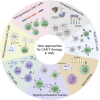Chimeric antigen receptor (CAR) modified T Cells in acute myeloid leukemia: limitations and expectations
- PMID: 38694825
- PMCID: PMC11061469
- DOI: 10.3389/fcell.2024.1376554
Chimeric antigen receptor (CAR) modified T Cells in acute myeloid leukemia: limitations and expectations
Abstract
Acute myeloid leukemia (AML) is an aggressive hematologic malignancy with a poor prognosis despite the advent of novel therapies. Consequently, a major need exists for new therapeutic options, particularly for patients with relapsed/refractory (R/R) AML. In recent years, it has been possible to individualize the treatment of a subgroup of patients, particularly with the emergence of multiple targeted therapies. Nonetheless, a considerable number of patients remain without therapeutic options, and overall prognosis remains poor because of a high rate of disease relapse. In this sense, cellular therapies, especially chimeric antigen receptor (CAR)-T cell therapy, have dramatically shifted the therapeutic options for other hematologic malignancies, such as diffuse large B cell lymphoma and acute lymphoblastic leukemia. In contrast, effectively treating AML with CAR-based immunotherapy poses major biological and clinical challenges, most of them derived from the unmet need to identify target antigens with expression restricted to the AML blast without compromising the viability of the normal hematopoietic stem cell counterpart. Although those limitations have hampered CAR-T cell therapy translation to the clinic, there are several clinical trials where target antigens, such as CD123, CLL-1 or CD33 are being used to treat AML patients showing promising results. Moreover, there are continuing efforts to enhance the specificity and efficacy of CAR-T cell therapy in AML. These endeavors encompass the exploration of novel avenues, including the development of dual CAR-T cells and next-generation CAR-T cells, as well as the utilization of gene editing tools to mitigate off-tumor toxicities. In this review, we will summarize the ongoing clinical studies and the early clinical results reported with CAR-T cells in AML, as well as highlight CAR-T cell limitations and the most recent approaches to overcome these barriers. We will also discuss how and when CAR-T cells should be used in the context of AML.
Keywords: CAR-T cell; acute myeloid leukemia; clinical trials; immunotherapy; target antigens.
Copyright © 2024 Guijarro-Albaladejo, Marrero-Cepeda, Rodríguez-Arbolí, Sierro-Martínez, Pérez-Simón and García-Guerrero.
Conflict of interest statement
ER-A has been a consultant to Astellas and Laboratoires Delbert, and received travel grants and/or speaker fees from AbbVie, Astellas, Eurocept, Gilead, and Jazz Pharmaceuticals. JP-S is an advisor or consultant for Novartis, Janssen, Roche, Jazz Pharmaceuticals, Amgen, and Gilead Sciences; reports research support from Novartis, Janssen, Pfizer, Roche, and Takeda; reports travel support from Roche, Gilead Sciences and Janssen; and reports patents, royalties, or other intellectual property from Entourage Bioscience on cannabinoid derivatives. EG-G has been a consultant to Cellgene and GLS, and received travel grants and/or speaker fees from Cellgene, Amgen, Janssen. EG-G is co-inventor on a patent application on the use of BCMA-CAR T-cell therapy in combination with ATRA, “Combination treatment of BCMA CAR-T and ATRA in multiple myeloma” (WO 2021/209498 A1), that has been filed by the University of Würzburg, Würzburg, Germany and licensed to T-CURX GmbH, Würzburg, Germany. The remaining authors declare that the research was conducted in the absence of any commercial or financial relationships that could be construed as a potential conflict of interest.
Figures
References
-
- Alvarez-Fernández C., Escribà-Garcia L., Caballero A. C., Escudero-López E., Ujaldón-Miró C., Montserrat-Torres R., et al. (2021). Memory stem T cells modified with a redesigned CD30-chimeric antigen receptor show an enhanced antitumor effect in Hodgkin lymphoma. Clin. Transl. Immunol. 10, e1268. 10.1002/CTI2.1268 - DOI - PMC - PubMed
-
- Bachy E., Le Gouill S., Di Blasi R., Sesques P., Manson G., Cartron G., et al. (2022). A real-world comparison of tisagenlecleucel and axicabtagene ciloleucel CAR T cells in relapsed or refractory diffuse large B cell lymphoma. Nat. Med. 28, 2145–2154. 10.1038/s41591-022-01969-y - DOI - PMC - PubMed
Publication types
LinkOut - more resources
Full Text Sources
Research Materials


